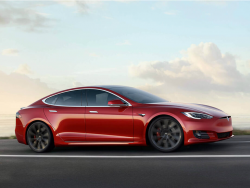
— A Tesla battery range loss lawsuit alleges software updates created to protect Model S and Model X vehicles from fires in reality caused reductions in the maximum battery capacity and travel range by 20 to 40 miles.
The proposed Model S and Model X class action lawsuit was filed by California plaintiff David Rasmussen, owner of a 2014 Tesla Model S 85 he purchased used from a private third-party seller.
Rasmussen says the car had about 32,000 on it when he purchased it and currently has about 137,000 miles on the odometer.
According to the lawsuit, Tesla harmed Model S and Model X customers in an effort to prevent battery fires, all by installing a "thermal management safety update" to “protect the battery and improve [its] longevity.”
Tesla allegedly issued software updates to all Model S and Model X vehicles after the automaker investigated a fire that occurred in China. Customers were told the updates were performed “out of an abundance of caution,” but the updates changed settings in the battery management software related to charging and thermal controls.
“As we continue our investigation of the root cause, out of an abundance of caution, we are revising charge and thermal management settings on Model S and Model X vehicles via an over-the-air software update that will begin rolling out today, to help further protect the battery and improve battery longevity.” - Tesla statement
But the plaintiff claims Tesla concealed knowledge the software update was allegedly used "to avoid its duties and legal obligations to customers to fix, repair, or replace the batteries of the Class Vehicles, all of which Tesla knew were defective, yet failed to inform its customers of the defects."
Tesla also allegedly failed to inform customers of the consequences of the software updates: Reduced battery range capabilities, longer times to charge the battery and an overall decrease in vehicle value.
According to the lawsuit, Tesla committed fraud by manipulating software in various ways. The plaintiff claims the automaker placed an artificial software-induced limitation on the total number of usable kilowatt hours (kWh).
This allegedly limits the ability of owners to charge the battery cells to the normal amount of 4.2 volts, reducing the performance of the vehicles.
The battery range lawsuit alleges Tesla should have warned customers about battery fire dangers and offered to replace the batteries, yet instead denies the software updates caused harm to customers.
Tesla allegedly knows the batteries are defective and issued the software update to allegedly avoid providing battery replacements under warranty.
"It is apparent that Tesla’s top priority is not the safety of its customers, but really, itself and its intent to avoid providing warranty battery replacements to rightful customers. Tesla cannot be exonerated from its greed and fraudulent intent, all of which have already harmed, continue to harm, and will continue harming innocent purchasers and consumers nationwide." - Tesla battery range lawsuit
The lawsuit says Tesla should replace the batteries, return the money paid for the vehicles and customers deserve any other relief they can get.
The Tesla battery range loss lawsuit was filed in the U.S. District Court for the Northern District of California - Rasmussen, et al., v. Tesla, Inc.
The plaintiff is represented by the Law Offices of Edward C. Chen.




